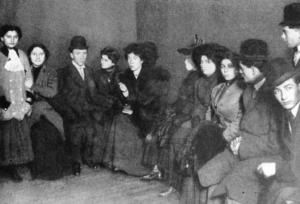| Contribute a translation | Source (English) |
|---|---|
The Dignity of Labor | |
Our God and Creator, You have created human beings in your image, endowing them with creative powers. | |
You have given them a resourceful mind and skillful hands wherewith they can dominate the world of nature; they can unlock its pent-up powers and make them serve their every want. | |
We thank you, O God, for the capacity to work wherein human beings are different from all other living beings. For these others survive by adjusting themselves to their environment, but humanity has survived by transforming its environment and adjusting it to itself.[1] This statement is demonstrably false, as there are numerous other creatures that transform their environment to their benefit. Beavers are perhaps the most obvious example. The rhetorical direction within which this statement is placed appears intended to underscore the tremendous hubris of humanity’s labor “when our plans conform not to [God’s] designs” (see following stanza). Distinguishing the agency of human beings from other animals seems to be a trope of these mid-20th century labor day prayers. | |
Grant that we may never abuse those powers that give dignity to our work, That we may ever remember that our creativity is your gift, designed for your service, and that, when our plans conform not to your designs, the structures we create collapse over our heads. | |
Give us the humility and the wisdom to employ our labors only to just ends, To purposes from which all can benefit and from which none will suffer hurt. | |
Check in us the greed of acquisition and the lust of domination, That we may all enjoy the fruits of our toil without denying to any the fruits of theirs. | |
Let us never forget our dependence on one another and on that spirit of brotherhood which is a manifestation of your love. For each of us by themselves is weak and helpless, and only our cooperation makes our work effective. | |
The tools that we use, the knowledge that we apply, the very bread that we eat, are not of our single creation but are the accumulated product of the toil and skill of many workers, over many generations. | |
Inspire us therefore with loyalty to all who work and with the spirit of mutual helpfulness and brotherly love. | |
Give us the strength to produce abundantly, the justice to distribute equitably, and the wisdom and self-control to consume prudently the goods that satisfy our needs, That we may all know the joy of creativity, the thrill of comradeship, the zest of health, and the peace of mind that are the reward of human labor when it conforms with your divine will. |
“Dignity of Labor” is a prayer for Labor Day first published in The Faith of America: Readings, Songs, and Prayers for the Celebration of American Holidays (Jewish Reconstructionist Foundation 1951), p.176-177. It is unclear from this publication whether the prayer was written by Mordecai Kaplan, J. Paul Williams, or Eugene Kohn separately or together in collaboration. I have replaced archaisms in this prayer (thee, thy, thou, etc.) and made other changes to make this prayer more gender-neutral (e.g. by replacing ‘Man’ with ‘human beings.’) –Aharon Varady
Source(s)

Notes
| 1 | This statement is demonstrably false, as there are numerous other creatures that transform their environment to their benefit. Beavers are perhaps the most obvious example. The rhetorical direction within which this statement is placed appears intended to underscore the tremendous hubris of humanity’s labor “when our plans conform not to [God’s] designs” (see following stanza). Distinguishing the agency of human beings from other animals seems to be a trope of these mid-20th century labor day prayers. |
|---|

“The Dignity of Labor, a prayer for Labor Day by Rabbi Mordecai Kaplan, J. Paul Williams, and Eugene Kohn (1951)” is shared through the Open Siddur Project with a Creative Commons Public Domain Dedication 1.0 Universal license.










Leave a Reply